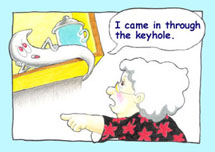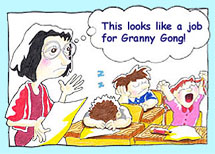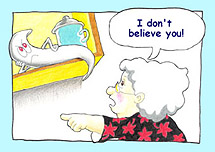Grammar: Sentence: Quoting and reporting speech and thoughts
| Reporting speech and thoughts |
Structure of indirect speech
We use 'indirect speech' when we wish to report the general meaning or 'gist' of what someone has said. In this case we do not pretend to represent the actual words used but merely their sense, with the words being the reporter's words rather than the original speaker's. We also use indirect speech for representing thoughts, and although there are no actual words spoken, we may report thoughts as if they had been spoken.
The typical structure of indirect speech is a complex sentence (or clause complex) made up of two parts: a 'reporting clause' and a 'reported clause' (ie the report itself):
| GrumpyGhost told Granny Gong reporting clause that he had come through the keyhole. |
 |
|
Miss Lee thought reporting clause that this looked like a job for Granny
Gong. |
 |
A reported clause may optionally be introduced by the linker (or conjunction) that:
|
Kitty said that her father had been a good football player. Kitty said her father had been a good football player. |
 |
The linker that serves as a signal of a following reported clause. It is more likely to be used in writing than in speech, and it is more likely in formal language than in informal. The two clauses, reporting clause and reported clause, are generally spoken as one unit, and that is not stressed. Click on the audio icon to hear the two examples.
Punctuation is not used to signal indirect speech and therefore the fact that a clause is reported (or indirect speech) may not be indicated formally at all.
The reporting clause in indirect speech usually precedes the reported clause:
![]()
| Granny said reporting clause (that) she
didn't believe the ghost. |
 |
Contrasting indirect speech with direct speech
Some of the most important differences between direct speech and indirect speech depend on the 'mood' of the clause, ie whether the clause is in the declarative, interrogative or imperative mood. Other differences concern how we refer to people, places, things etc, as well as the tense used in the verb group. Here is a summary of the grammatical differences between direct and indirect speech:
| Mood | |||
| Interrogative mood changes to declarative 'indirect speech', and the imperative mood adds to before reported clause: | |||
| yes/no interrogative: changes to declarative, preceded by if or whether | |||
| Dotty asked, "Is
the movie on tonight?" [direct speech] Dotty asked // if the movie was on tonight. [indirect speech] Dotty asked // whether the movie was on tonight. [indirect speech] |
|||
| wh- interrogative: changes to declarative, preceded by wh- element | |||
| Mr Gong asked, "Where
is my toolbox?" [direct speech] Mr Gong asked // where his toolbox was. [indirect speech] |
|||
| imperative: preceded by to | |||
| Miss Lee said to the class, "Sit
down!" [direct speech] Miss Lee ordered the class // to sit down. [indirect speech] |
|||
| Reference | |||
| personal pronoun: changes from 1st and 2nd person to 3rd person | |||
| Granny says, "I
don't believe
you."
[direct speech] Granny says // (that) she doesn't believe him. [indirect speech] |
|||
| demonstrative determiner and pronoun: changes from near to remote | |||
| Kitty said, "I don't like this
song." [direct speech] Kitty said // (that) she didn't like that song. [indirect speech] Kitty said, "I didn't know about this." [direct speech] Kitty said // (that) she didn't know about that. [indirect speech] |
|||
| time and place: changes from near to remote (adverb) | |||
| Inspector Fu said, "We'll arrest the
robber tomorrow." [direct speech] Inspector Fu said // that they would arrest the robber the next day. [indirect speech] Mr Wing said, "I'll be waiting for you here." [direct speech] Mr Wing said // that he would be waiting for them there. [indirect speech] |
|||
| Tense | |||
| Tense changes to more remote, eg present simple to past simple, past simple to past perfect etc: | |||
| Bozo said, "I helped
Miss Lee." [direct speech] Bozo said // (that) he had helped Miss Lee. [indirect speech] Bozo said to Miss Lee, "I can help you." [direct speech] Bozo told Miss Lee // (that) he could help her. [indirect speech] |
|||
| Linker | |
| Declarative reported clause is optionally preceded by that: | |
| Bozo said, "My teacher is terrific." [direct speech] Ricky said // (that) his teacher was terrific. [indirect speech] |
|
Grammar books usually state that when we change a clause from direct speech to indirect speech, its structure must be changed in respect of the features listed here. However, only some of these changes are obligatory and some depend very much on the context in which a speaker or writer reports what was said or thought. More importantly, since direct and indirect speech have different uses, we must not see them as being simply different forms that can be changed at will from one into the other without regard to their context.
| For information about some of the problems that students have with indirect speech, click here: |  |
|
Alternative terms |
|
| PrimeGram | Other grammars |
| clause | simple sentence |
| clause complex | sentence, compound sentence, complex sentence |
| quoting | direct speech |
| reporting | indirect speech |
Tell me more ... Tense in indirect speech |
|
||
To give us feedback about this section, click here or on the Comment button at the top of the screen.
If you have any questions about this section, visit the Language Corner.
If you have any questions or suggestions about how to teach this section, send a message to the Teaching Corner.